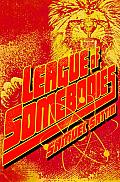
What is it that impels the phenomenon of the sidekick? In the comic book world in particular, since the 1950s mostly, when the United States was wrestling with communism and moral decadence as the '60s prepared to explode, every superhero had to have a tagalong, a smaller version of his or herself (though mostly his self) that was snappy with one liners, innocent, jejune, and ready to follow the leader. Of course on the surface, the reason behind boy wonder's entrance into mainstream comics culture isn't too complex. Sidekicks are a mainstay in literature, from
Don Quixote and Sancho Panza to
Samwise Gamgee and Frodo. Batman and Robin are only a modern reiteration of one of the oldest storytelling traditions on the planet. I assume that even major Babylonian gods had their personal number twos, naïve fall guys to take the blame when a volcano engulfed a small village or a virgin fell down a well.
One might argue that creating a sidekick is an attempt to bring a reader's deepest desires to the forefront. When it comes to comic books, anyway, I can assure you there is nothing a fanboy wants more than to, if not be a hero, at least be noticed by one.
I've always felt an immense amount of empathy toward sidekicks myself. I assume this is probably because I was one. Throughout my life, but especially during my high school years, I always sought shelter with stronger members of my gender, cozying up to my identity as loyal stooge in return for round-the-clock protection. To describe it now, it sounds like I was in a prison. But really, any marginal concentration of adolescent boys behind a series of red brick walls pretty much constitutes the equivalent of Sing Sing.
For some reason, at around the third grade, I'd become the target of rumors and beatings. It was an effect that snowballed over time. The only friendships I attracted as I moved into middle school were those of anti-establishment punk rockers (who liked me for some reason, even though I wasn't sure I liked them) who were a year or two older than me, and the occasional acid-tripping, psychedelic Dungeons & Dragons geek with boxes full of stolen pornography.
The punk rockers in particular were the best protectors to have, being that they thrived on a healthy diet of nihilism and blinding pain (the drugged-up über-nerds, not so much). I ended up surrendering my autonomy in return for a safe day at school, knowing that if I listened to them sit in a room playing half-hacked guitar riffs for six hours, I could expect them to repel the schoolyard bullies with a skateboard straight to the dome.
Every male character in my book, League of Somebodies, is accompanied, with rigorous precision, by a version of the magnificent creature he thinks he is. This effect is so pervasive, it gets to the point where the relationship begins to resemble owner and property. A sidekick makes a hero better than he or she already is, anyway, and the relationship is master/slave in its construct. Alone, a hero must answer for his own actions and be responsible, consequently, for the fallout. But with a younger, stupider, more impressionable naïf to accompany him on every single journey, embarrassment can always be avoided by the miracle of scapegoating.
Heroes make the headlines; they drink down images of themselves on television or the Internet. Sidekicks, however, are always out of focus, off to the side, striving for recognition or uncomfortable to be there in the first place. Painfully loyal in exchange for the privilege of running with the strong, if anything, a sidekick exists to keep the hero from revealing his faults. The narcissism of the mighty bleeds into our creative energy and keeps this hierarchy intact.
More from Samuel Sattin on PowellsBooks.Blog: